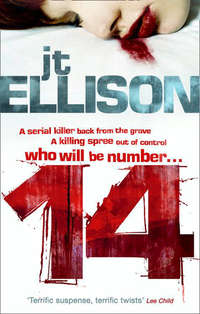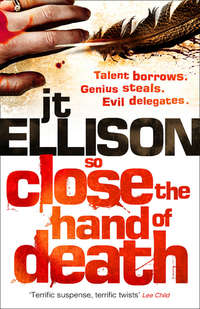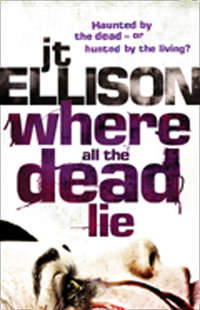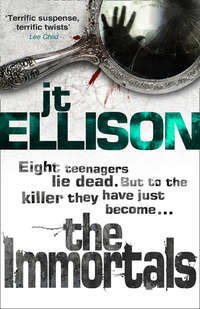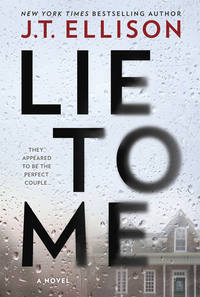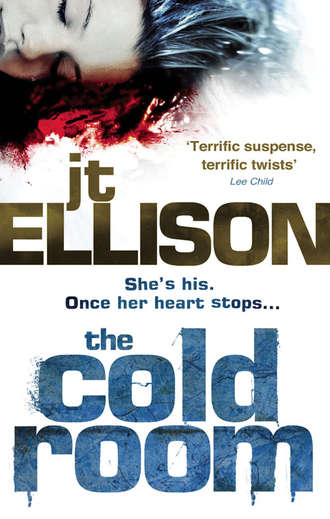
Полная версия
The Cold Room
Back in the living room, she circled the body again, looked closer at the filament that held the girl’s arms, legs, torso and head in position. It was tied in little knots on the backside of the column. The killer had taken the time to staple the translucent fishing line into the wood to give it extra holding power. This was well thought out, planned in advance. It had taken time to get the girl up on the post. Which meant whoever committed this murder knew that the house was going to be empty, that he’d have a fertile, undisturbed playground. Either that, or they had another body to find, one belonging to the owner.
Taylor stepped three feet back from the post, taking in the rest of the setting. The columns bisected the two rooms; there were crime-scene techs moving around, disturbing her view.
“Hey, can everyone hold up for a minute? I’d like to get some shots here.”
Long accustomed to Taylor being in charge, people moved out of her way.
She fished her digital camera out of her jacket pocket, took a couple of pictures. Something felt strange, and she couldn’t put her finger on it. Maybe later, once she’d had time for her mind to process the scene, she’d be able to see what was out of place. Or Baldwin would.
She turned the camera off. McKenzie appeared at her side, appropriately silenced by the gruesome visage in front of them. Paula took her flanking position and the three of them stood in a moment of peace, watching, reverent. The victim’s nudity was embarrassing McKenzie. Taylor could see him shifting his feet like a little boy out of the corner of her eye.
She ignored him, stared again at the knife pinning the girl to the column. Tim Davis joined them.
“We’re going to have a pissed-off home owner. I’m going to have to cut the post down, I think,” he said.
“Why?” McKenzie asked, puzzled.
“Because there’s no way to get that knife out of her without disturbing the wound tract.” Tim stepped closer to the body, put his thumb on the flat end of the knife handle, exerting pressure experimentally. It didn’t budge, didn’t shift slightly. “See, this thing is jammed all the way into the wood. We’ve gotta cut her down, take a whole section of column with us to the M.E.’s office. No other way to do it.”
“Oh. Yeah, absolutely. Gotta cut it.” McKenzie was nodding like he’d thought of that himself.
Taylor cracked her knuckles and circled the column again. “This thing must be ten feet tall. Think it’s load-bearing?” she asked Tim.
He shook his head. “No. See the line at the top? It’s just decorative, glued then nailed into place. If it were one of the other two,” he gestured to each side of the body, “we’d be in trouble. This one is detached, for the most part. Won’t be too bad to replace.”
“Okay, Tim, do what you need to do. Try to delay a few minutes for me, though. Baldwin is on his way. I’d like him to see this intact.”
He nodded at her. “I’ll go get the saw.”
Taylor stepped back and considered the victim again. She couldn’t shake the feeling that she’d seen this before. In addition to that, one very obvious incongruity screamed out at her.
She turned to the patrol officer on her left. “I have a question for you, Paula.”
“Shoot,” Paula said.
Taylor pointed at the dead girl. “Where’s the blood?”
Three
John Baldwin decamped from the taxi ten minutes later. Perfect timing.
Taylor glanced around but didn’t see Elm anywhere. She’d have to introduce him to Baldwin, and based on their brief exchange, she had no idea how he would feel about the FBI being at their scene. When she was the lieutenant, it was her call, and she was always willing to have a fresh set of eyes. Elm struck her as the type of cop who would get territorial. Well, she’d cross that bridge when she got to it.
Taylor watched Baldwin walk up the drive, vivid green eyes taking in everything until they settled on hers. She wondered what he saw there, sometimes. He was a veteran of crime scenes, had been the lead profiler on hundreds of cases. He knew the score. Knew what kind of monsters lurked in her head. They lurked in his, too.
Her mind was drawn away from the crime. She forgot how big he was when he was away. As tall as she was, she still had to look up at him. She loved that. In the dark, his black hair looked like midnight, his angled cheekbones highlighting his mouth with shadows. As he got closer, she could see he hadn’t shaved, the soft stubble growing back at an alarming rate. Hmm.
He didn’t kiss her, though she wanted him to. It wasn’t professional—she knew that—but she hadn’t seen him in two weeks and she missed the feeling of him next to her. He did caress her arm, just above her wrist, and it burned as she walked him to the sign-in sheet, then into the house.
“Make it quick,” she said quietly. “We need to get her body down so the techs can finish up in here. And the new lieutenant is around somewhere. He might kick up a fuss that you’ve come.”
Baldwin nodded. He still hadn’t spoken, was simply processing. That’s what she liked about him. There was no extraneous bullshit, no posturing. Just an incessant curiosity about what made people do bad things. That was something they shared, a core desire to figure out the why behind the crimes.
She escorted him over to the body, then stepped away and let him assess the scene.
His lips were set in a tight, thin line, and she could see the dark circles under his eyes. He was exhausted. Working a case always did that to him. His job as the head of the Behavioral Analysis Unit, BAU Two, was to guide the various profilers who worked for him, and to give the various law enforcement entities requesting help a thorough rundown of what they were dealing with. Taylor knew that it went deeper for him. He wanted to do more than look at crime-scene photos and pump out a report. He liked to get in the field, to smell the scene, see the crime in situ. Well, she was giving him his heart’s desire with this one.
Baldwin broke his verbal fast. “Where’s the blood?” he asked.
Taylor smiled. “I said the same thing. There’s something else totally bizarre. There was a classical piece from Dvořák playing on the house’s intercom system.”
“Really? Hmm.”
“The owner of the house is allegedly out of town. There was a piece of glass cut out of the back door so our suspect could turn the lock. The next-door neighbor is caring for the cat—she came over and found the body. She couldn’t say if the music was on or off when she arrived—she wasn’t paying attention. We included the CD in the evidence gathering. The lack of blood, the music, the position of the body—I can’t help but think this is a ritual. That’s why I wanted you to see it.”
He ignored her for a moment, moving back and forth between the wall and the column. He spoke absently. “The suspect could have been playing the music to cover any noise he might have been making. Taylor, step over here with me a second. Look at the wide view.”
She went as far back as the house allowed, to the bay window on the west side of the kitchen. He went with her, standing quietly while she looked. She had taken a picture earlier from this angle, a wide shot of the room face-on to the body.
“Okay. What am I missing?”
“Look at the painting on the wall by the door, in the left upper quadrant, line-of-sight to the column.”
That was it. The strange sense that something wasn’t right, the feeling that she was missing something. It was there in front of her the whole time.
“Son of a bitch. She’s posed just like the painting. Who is that, Picasso?”
“Yes. Demoiselles d’Avignon. The victim’s arms are up over her head, a perfect imitation of the center of the painting. And this was Picasso’s most famous piece from his African Period. Your victim is black. He’s accurately mirrored the painting. There’s no blood. But the race …”
He drifted off.
“What is it?” she asked.
“Taylor, you don’t want to hear what I have to say. I’m having a hard time believing it myself.”
“It’s too early to surmise that we might have a serial on our hands.”
“It’s not that. Actually, it’s much worse.”
“What then?”
“I think you may have my serial on your hands.”
Four
Baldwin waited for Taylor’s mind to register what he’d told her. Hell, he needed it to register in his mind.
“What are you talking about?” she asked.
He spoke quietly. “How much do you remember about a killer named Il Macellaio?”
“I don’t. Not that much. Only what you’ve told me. He’s a serial killer in Florence, Italy, has been working for a number of years. Doesn’t the name translate to ‘the Butcher’?”
“Yes. Il Macellaio has been around since 2000 or so. He’s ruthless, and he’s very, very good at what he does. He poses his victims to emulate famous paintings, leaves a postcard of the painting behind so we know exactly who he’s imitating. Of course, that’s after he tortures them. He keeps them alive as playthings for a while before he kills them. His earliest victims’ cause of death was actually starvation, though his latest were starved and strangled, like he got tired of waiting. He has sex with the bodies, a final farewell, before he stages the scenes. Until now, we’ve not had a lot of physical evidence to go by. Did you get a cause of death on your victim?”
“Ugh. Necrophilia?”
“Worse, much, much worse. Necrosadism. Il Macellaio’s pathology developed to the point where his fantasies about having sex with corpses wasn’t enough. He was driven to actually capture and kill women to act out his fantasies with. Very, very rare. Starvation is a cruel way to die. It’s somewhat passive-aggressive, actually, which is fascinating, considering he’s being driven by his desires to kill. I’m not entirely sure why he does it, though I’ve got some ideas. And looking at this girl, she’s certainly gone without nourishment for a while.”
“Lovely. I’ll make sure Sam is aware of the background. The COD isn’t apparent but you’re right, she’s ridiculously skinny. Bones sticking out everywhere. Did you notice the knife went all the way through her chest and into the post?”
“I did. You’ll have to—”
“Cut it down. I know,” she interrupted, signaling to her crime-scene tech. The young man with solemn eyes Baldwin knew as Tim Davis nodded grimly and went to work with his hacksaw.
Taylor was pacing in short bursts. Baldwin led her a few feet away so they could talk privately.
“Baldwin, is it possible that Il Macellaio has come here from Italy? And why? Nashville isn’t exactly on the beaten path of most world travelers. New York, Los Angeles, I can see. But us?”
He scrubbed his hands through his hair to help him think, not caring that it would be standing on end. “Part of what I’ve been dealing with in Quantico is a report from London. The Metropolitan Police at New Scotland Yard have three murders that bear an eerie resemblance to the Florence cases. If I’m right, and Il Macellaio went to London, it’s within the realm of possibility that he could come here.”
“What would take a serial killer from Florence to London, and then to Nashville?”
“You ask an excellent question. We had a break in the Florence case last week. Finally got some DNA. We’re waiting for it to clear the Interpol databases, see if they have a match, and it’s running through CODIS. I expect we’ll have the results back sometime tomorrow. You know how things shake out. We might get a name, we might be off on another wild-goose chase. If we get a name, I’ll probably have to head back up there.”
CODIS. The wundertool. The combined DNA index system could match killings and killers. Baldwin sent a brief prayer of thanks out to Sir Alec Jeffreys for finding the DNA fingerprint that led them to this point. One day, there would be DNA on file for every criminal in every country, and there would be instantaneous matches.
Taylor was appropriately intrigued. “That’s awesome, babe. How’d you get DNA after all these years?”
“Long story or short?”
She waved at the scene in front of them, Tim sawing away at the post, cursing in G-rated, first-class Southern style—dagnabit, almost had you, dadgumit, get back here—and he had to fight back a smile. She met his eyes and he could see the mirth bubbling in their stormy depths. She liked that Tim kid.
“I’ve got time,” she said. “Tell me about your murders.”
“That’s got to be one of the most romantic things I’ve heard you say.”
“I knew there was a reason why you love me,” she whispered.
“I do love you. Desperately,” he whispered back.
He felt a hand on his arm. A short man, bristling with indignation, stared up at him.
“Who is this, Detective?” the man snipped.
Taylor made eyes at Baldwin for a second, then did the introductions.
“Lieutenant Elm, this is Supervisory Special Agent John Baldwin, Unit Chief of the Behavioral Analysis Unit at Quantico.”
“And what, pray tell, is the FBI doing at my crime scene?” Elm’s face was turning red, a pot ready to boil over. Baldwin stuck out his hand to shake.
“I was in the neighborhood and Detective Jackson suggested I take a look. This isn’t exactly a run-of-the-mill murder.”
“I don’t remember inviting you, Mr. Baldwin.”
“It’s Doctor, actually, sir. My apologies for the intrusion. But I must tell you that this looks like the work of an organized killer, and I wouldn’t be surprised to see him strike again. I would be more than willing to sit down with you and give a profile.”
“Profiling,” Elm spat. “Voodoo, mind-reading crap, if you ask me. I think we’ll be just fine without your help, Doctor. That is all.”
Elm marched away from them. Baldwin glanced at Taylor. Her face was suffused with blood and she was biting her lip. He’d seen that look before; she was torn between laughing and cursing.
“That’s your new lieutenant?”
She nodded.
“Well, this is going to be fun. At least he didn’t try to bodily remove me.”
“That happens?” she asked.
“You’d be surprised,” he said lightly. “Where were we?”
“Florence, where I’d rather be right now.”
He smiled at her. “Don’t try to distract me. It won’t work. Right. Three bodies ago, back in Florence in 2004, the carabinieri’s very sharp crime-scene technician found a hair with an intact skin tag in a puddle of water in the kitchen where the victim was found. It didn’t match her DNA. They put it in the system and kept it flagged, just in case. Last week, we got the call from the Met. They had a series of murders that they determined were serial, and asked for a consultation. When I looked at the crime-scene photos, I saw the signature of our Italian boy. But the beautiful thing is, the techs at the Met found an intact hair, too, this time curled in the back of their second victim’s throat.”
“Ugh.”
“Yes. There were enough similarities between the cases that I insisted we test the two hairs’ DNA immediately. Two hairs in five years. We’re crossing our fingers that there’s a match between the two. If he’s committed any other crimes and is in the database, we might get a lead. Who knows? If the DNA matches, then at least I can confirm that he’s on the road. That’s what I’m waiting for.”
“But how long does it take to starve a woman to death? It seems like the time frame is too short for this to be a part of the series.”
“If you subscribe to the rules of three … three minutes without air, three days without water, three weeks without food. That’s not a perfect formula, but close enough. Deprived of water and food, a small woman could easily die within two weeks. Maybe less. The last London murder scene was over a month ago. He could have made it to the States, taken your victim, starved her, then posed her. It’s feasible. Any postcards around?”
“Not that I’ve seen.”
Taylor was quiet. He could feel her thinking. After a moment, she spoke again.
“See, there’s something else odd about this scene. I need to go do a ViCAP search. It wasn’t my case, wasn’t even in Nashville. It was south of us, in Manchester. But I remember reading something in the Law Enforcement Bulletin about an unsolved murder three years or so ago where classical music was playing when they arrived at the scene. Tonight, the CD player in the kitchen had that Dvořák piece playing on a continuous loop. Do you have any of that in your cases?”
“No, we don’t.”
“The owner of the house might have left it on accidentally. We pulled a palm print off of the casing, so we’ll see. I’m relatively certain that the body was transported from another scene. The lack of blood on the girl’s body and on the floor … she was killed elsewhere.”
“Probably. There wouldn’t be a lot of blood in a starvation case anyway.”
“There could have been two people involved, one to hold the body against the post and one to tie the fishing line around her body. It might be hard to control alone, but a strong man, starting at the victim’s feet, could have managed easily. The girl’s toes were two feet off the floor. He could have had her in a fireman’s carry, slumped over his shoulder, while he tied the line around her ankles.”
“Or he might have looped the line around the bottom and tied it loosely, then inserted the dead girl’s legs into the loop. Tighten it down, and voilà, there’s a base to start with. He could have slowly worked his way up the body.”
“Yeah, you’re right,” she said. “That’s how I would do it if it were just me.”
Elm was in the kitchen now, imperiously bossing around the videographer, Keri McGee. Taylor cringed at the sound of his voice. Baldwin knew how hard this was for her—the past few weeks had taken their toll on both of them. Maybe a big, juicy case would be a welcome diversion, even if they were being overseen by Napoleon.
He tried to draw her attention back to the victim. “Slamming the knife through the victim’s body with enough force to embed it that deeply into the wood was overkill. She’d been dead long before she had been placed on the post. There’s rigor leaving her jaw and some decent lividity on the edges of her legs.”
Taylor’s focus returned immediately. “So she lay on her back at some point soon after death,” she said.
“Did you notice the fishing line eating into her skin?”
“Of course. There was also some petechial hemorrhaging in her eyes, but not so much that I’d automatically assume she’d been strangled. Hopefully Sam will have her in the morning for the autopsy. She’ll get to the bottom of it.”
Baldwin took the hint gracefully. There was more work to be done, things that he wasn’t needed for. “Why don’t I go make some calls? Is there someplace …?”
She handed him the keys to her pool car. “It’s the one right by Tim’s van. I’ll be with you as quickly as I can. Thank you for coming out.”
He longed to kiss her, but simply nodded and left. The post was coming down as he walked past, the girl riding the wood, still solidly attached by the fishing line and the knife sunk deep into her chest. It looked like half a crucifixion. Nothing he’d forget for a long while.
Taylor rubbed her eyes, forcing the itch of sleep away. It was two in the morning; the crime scene was winding down. Elm’s prediction that it would only take an hour was six hours off.
Tim had successfully removed the body of the victim, still attached to a nearly seven-foot-long column of wood by the fishing line and the knife. It was a wild scene. Getting the dead girl in an appropriate horizontal plane so she could go into the body bag had been tricky, and they couldn’t close the bag all the way. Despite the victim’s low weight, the column was heavy. People on both ends of the post heaved and strained not to drop her, to preserve the evidence.
After that, the rest of the evening had gone smoothly.
Elm had vacated the house about an hour earlier, which was fine by her. She’d seen him talking to one of The Tennessean reporters who’d made an appearance, prayed he’d shown a modicum of discretion. Dan Franklin, the department’s spokesperson, had shown up and handled the media after that. Some of the news folks were still hanging around; nothing else had captured their attention. A quiet crime night in Nashville, which guaranteed this murder would make the morning news.
Taylor had been avoiding the media all night, refusing to give a statement, leaving that to Franklin. She hadn’t forgiven them for their role in her demotion, for running with the allusions and innuendoes planted by a man out for revenge against her. For showing videos of her having sex with her old partner; tapes that were made without her knowledge or permission. Every time she thought about the humiliation she’d endured, having to watch herself on television.
Stop it, Taylor. What’s done is done. They are the media. You were newsworthy. Leave it at that. It wasn’t personal. You’d investigate each and every one of them six ways to Sunday if you thought they’d done something illegal. Why should they be any different? Everyone needs to feed the family. Focus.
She went back to her mental wrap-up of the crime scene. Footprints had been found in the woods behind the house, and cigarette butts, but they were far enough removed from the actual scene that Taylor was skeptical that they’d come from the killer. Every bit had been processed, of course, the techs putting together the molds, spraying the ground with Dust & Dirt Hardener, making impression casts of at least four different shoe prints. If they found a suspect, they could look for a match to test against the shoe impressions.
There was still the issue of transport. The killer had gotten the body to the house somehow, but so far the canvas of the neighborhood had turned up nothing of use. No one had seen a car or van around the area that didn’t belong. Of course, considering how many people tooled around Love Circle for fun, she suspected the residents were inured to the sight of strange cars.
There were tons of kids that roamed this area at night. They were usually harmless, looking for a quiet place to smoke some dope and drink, neck, and ponder the questions of the world. Not surprisingly, the regulars scattered when the police had driven up the hill, melting away into the night. They’d be back. Taylor would wait them out, talk to them another night. Maybe a stranger had noticed something.
The odds that one of them was her suspect … well, she never assumed. She would wait for the results of the investigation, let the evidence be her guide.
She’d talked to the neighbor, Carol Parker, had gone at her hard to make sure nothing was missed. The woman sat on her couch, hefty thighs encased in brown knit firmly pressed together, feet flat on the floor, her round face white. She held the Siamese cat from next door, stroking the fur obsessively as she relayed her actions during the past few days house-sitting. No, she hadn’t noticed any cars today, she’d been at work. No, she didn’t realize anything was amiss until after she’d fed the cat and turned to leave. No, she couldn’t remember if she’d heard music, but the owner usually left some sort of noise playing, a television or a radio, for the cat, so she wouldn’t have thought it strange. She thought she’d turned the alarm on when she left the previous day, but might have forgotten. No, she didn’t remember touching anything but the front door and the cat’s dish; she’d seen the body and run.
Taylor went through her every move, then gave up after twenty minutes. The woman didn’t have anything that would be of use to them tonight. Maybe in the morning, when the shock of the evening wore off, she’d be able to recall anything that seemed out of place. She had given Taylor the name and cell phone number of the house’s owner. His name was Hugh Bangor, and Taylor left him a voice mail asking him to call her as soon as he received the message. Parker said he was in Los Angeles, but didn’t know where. If that were the case, it would certainly be tomorrow before he’d be able to come home.



